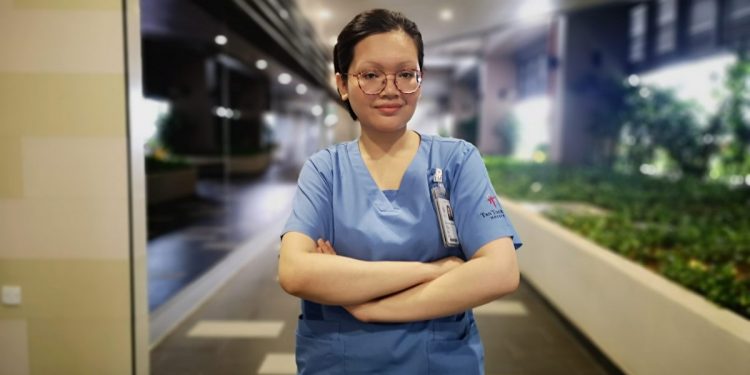What is it like to work in a place where ordinary, everyday people check in with infections? What about the people behind the masks and protective gear that deal with these admissions?
LabourBeat strikes up a conversation with 36-year-old mother of two and an assistant nurse who works at the National Centre for Diseases (NCID) located at 16, Jalan Tan Tock Seng.
The 330-bed facility, which opened in September last year, also has more than 100 “surge beds” which are kept empty and on standby for national emergencies. According to its website, NCID is “designed to strengthen Singapore’s capabilities in infectious disease management and prevention”.
Back to Hetty, who has a few stories to tell on what it is like to work there and what others make of her, especially in the current COVID-19 pandemic situation.
“I had an encounter with a taxi driver who drove me to work. He was very wary of my destination to NCID and asked questions on whether I was sick and why was I not wearing a mask [before it was mandatory].
“I took it as an opportunity to educate him, as a nurse, about our hospital’s precautionary measures. I assured him that medical personnel follow strict infection control protocols and are always well-prepared to face any outbreak crisis,” shared Hetty.
She showed him a picture of herself in a full personal protective equipment (PPE) suit, which is often made up of protective clothing, helmet, goggle, or other garments and equipment designed to protect the wearer’s body from injury or infection.
Working at NCID
Hetty shared details of the negative pressure rooms at NCID. Nurses like Hetty are also required to go for courses to prepare for any outbreak. All said and done, the taxi driver was impressed and praised Singapore for its outbreak readiness.
“For me, the safest place is when I’m at work. We don our full PPE at all times when attending to our patients. Our isolation rooms are negative pressure rooms which prevent cross-contamination from room to room.
“We practice team safety by monitoring our temperature twice daily and log it into our system even when we are not on duty to ensure that we are fit. We do not wear our usual uniform when we are in the outbreak wards. Instead, the hospital supplies us with outbreak T-shirts and pants to wear and launder them for us daily.
“We shower and change into home wear before leaving the outbreak area. We are well prepared to care not only for our patients but also for the whole of our community,” described Hetty, on how NCID nurses stay safe at work.
Getting Personal at Work
Apart from the safety precautions at work, nurses like Hetty deal with patients on a personal level every day.
On a shift one day at lunchtime, her department had four admissions, at an interval of five minutes each. During one of the admissions, a patient shared that his whole family would be admitted too.
“I immediately empathised with him as I can imagine how heart-wrenching it must be to have his whole family affected by the virus. I reassured him that everything would be alright because they would be well taken care of by our medical team and nurses.
“He smiled to acknowledge me and said he appreciated my time to comfort him despite knowing that we were busy. He gave his well-wishes and said, ‘God bless you and all of you unsung heroes,’” she said.
It is moments like these that Hetty feels truly good about what she does. She tells of how nurses like her have received food, gifts and care packs from organisations and individuals.
The show of care and concern from the public has given her fraternity a sense of recognition and belonging.
“It boosts our morale to strive even more for our patients and the nation. We thank everyone for their tremendous support, and we appreciate the gifts.
“It has been a rollercoaster journey. There have been highs and lows in my experience as a nurse, especially when handling SARS cases and now COVID-19. The happiest moment is when a patient and their relatives appreciate the work we do and send us thank you cards, among other gestures. It is very satisfying when my name is mentioned on the feedback forms,” she shared.
For someone who has always wanted a career with a difference and one that has brought her to become one of the many unseen super frontliners in light of the COVID-19 pandemic, the ITE Bishan-certified nurse is one brave soul that deserves our gratitude.
“It has always been my ambition since school that I wanted to do something in my career that is challenging and makes a difference in people’s lives. In nursing, you deal with many aspects of patient care, and I enjoy the variety in the routine,” said Hetty.

